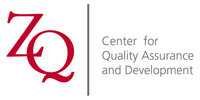The concept of establishing an evidence base for controlling and professional actions in institutions is also gaining increasing attention as a comprehensive innovation in the field of education. Central to this concept is the aim of making empirically adequate findings useful as "control knowledge" for policy and practice, in order to promote more efficient and effective service provision. However, empirical findings or "evidence-based" knowledge cannot simply be transferred directly into successful "evidence-based" actions in schools. This is where the EviS research association comes in and assesses the personal arrangements and routines of the protagonists in the school system, as well as the organizational structures, cultures and context factors in schools in the Rhineland-Palatinate which could either promote or hinder evidence-based actions. This complex question is incorporated into a central project and two sub-projects, in order to identify effective strategies for knowledge transfer to schools, and thus contribute to promoting an evidence-based administrative and educational school experience.
A representative sample of 2,000 qualified teachers and school leaders from a total of 150 general and vocational schools in the Rhineland-Palatinate are asked about their knowledge of, and their attitudes towards, control measures in the educational system (e.g. evaluations) and about how they handle new findings arising from these measures. Central organizational factors that could be either promotive or restrictive are compiled at school level. This inquiry provides information at the level of individual teaching staff, at school leadership level and also at organizational level, and can thus record influences between the levels investigated.
Alongside the main inquiry in schools, sub-project 1 addresses the emergence, prerequisites and development of professional handling of evidence-based knowledge and the associated willingness. Students and trainee teachers in the areas of Educational Studies and Business Education are asked about their skills, experiences, and their attitudes towards control tools and quality development measures in schools. In addition to he quantitative questionnaires, qualitative interviews with students and trainee teachers are also held during both survey sessions, in order to capture the reflection processes and to complement the quantitative findings.
Once the main inquiry has been completed, eight schools are subjected to closer inspection in sub-project 2. Here the focus is on handling evidence and obtaining a deeper understanding of the findings through interviews and a network analytical approach.
The interdisciplinary EviS joint research project is carried out by the Center for Educational and Higher Education Institute Research at Johannes Gutenberg University in Mainz (JGU) and Duisburg-Essen University. The Federal Ministry of Education and Research is sponsoring the initiative over a three year period.
Project duration: Oct 2010 to Sept 2013
|
Main project leadership |
|
|
Prof. Dr. Olga Zlatkin-Troitschanskaia Chair for Business Education, JGU Mainz |
Prof. Dr. Isabell van Ackeren Faculty of Educational Studies, Universität Duisburg-Essen |
|
Project leader |
|
|
Junior-Prof. Dr. Carmen Binnewies Psychologisches Institut, JGU Mainz |
Prof. Dr. Marten Clausen Faculty of Educational Studies, Universität Duisburg-Essen |
|
Prof. Dr. Christian Dormann Psychologisches Institut, JGU Mainz |
Prof. Dr. Peter Preisendörfer Institut für Soziologie, JGU Mainz |
|
Dr. Uwe Schmidt Zentrum für Qualitätssicherung und -entwicklung, JGU Mainz |
|
| Project employees | |
|
Dipl.-Soz.-Wiss. Denise Demski Faculty of Educational Studies, Universität Duisburg-Essen |
Dipl.-Soz. Caroline Kiemle Zentrum für Qualitätssicherung und -entwicklung, JGU Mainz |
|
Anna Rosa Koch Psychologisches Institut, JGU Mainz |
Dipl.-Hdl. Daja Preuße Department of Business Education, JGU Mainz |
|
Christoph Rosenbusch, M.A. Zentrum für Qualitätssicherung und -entwicklung, JGU Mainz |
Anna Skarbek-Kozietulska, M.A. Institut für Soziologie, JGU Mainz |
